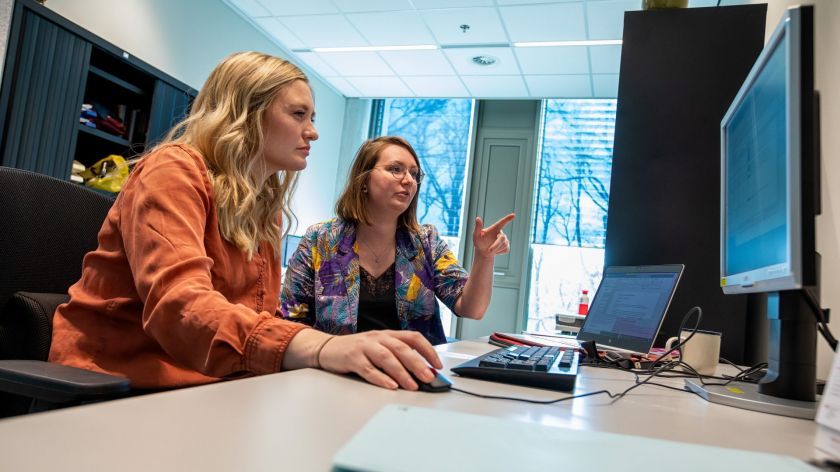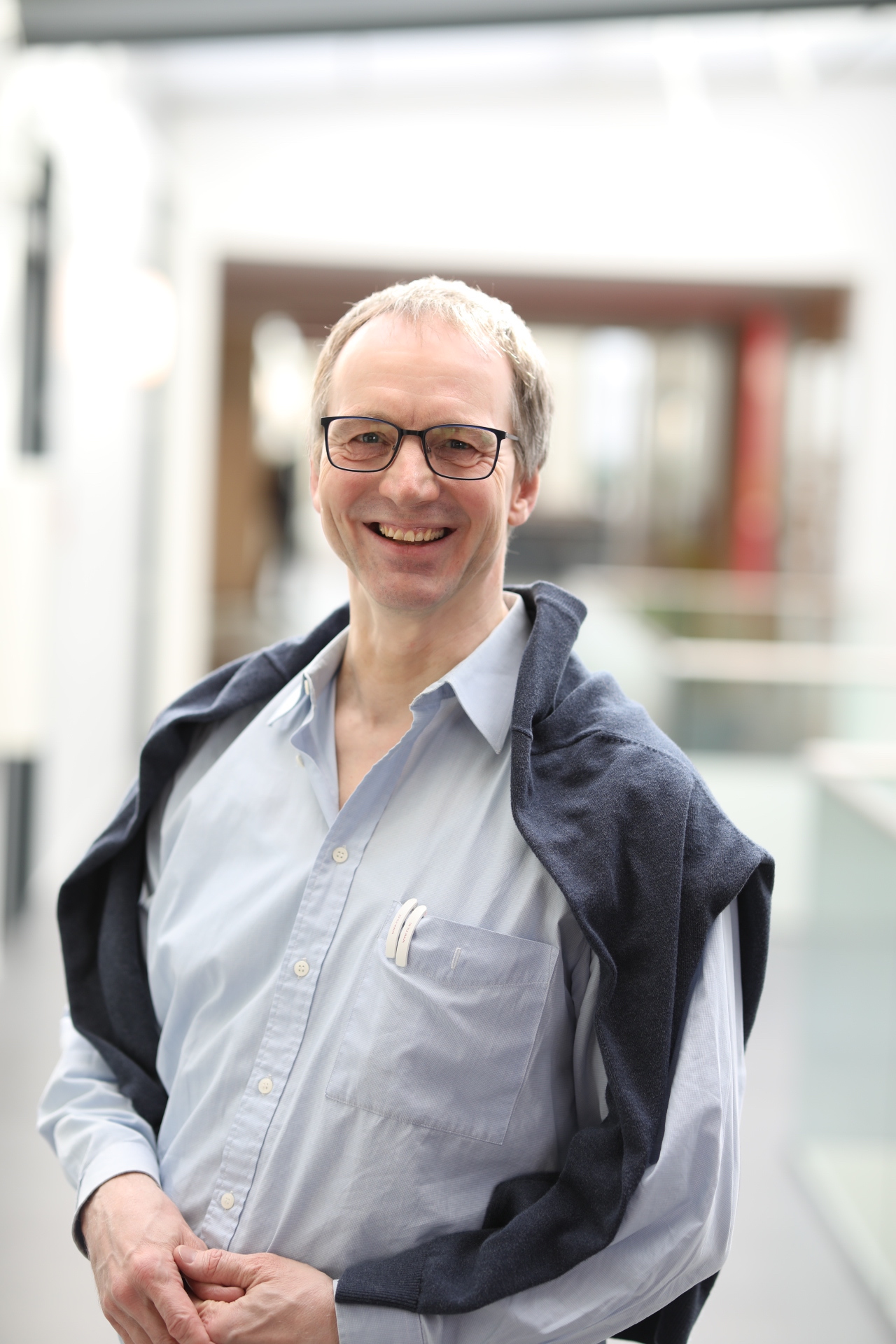Personal workspaces, exit interviews, and more international students: this is what the parties in the Works Council want
-
 An office in the Montessori building. Photo: Dick van Aalst
An office in the Montessori building. Photo: Dick van Aalst
The elections for the Works Council will start on Wednesday. What do the leaders of the four participating parties want to achieve? ‘If more employees vote, we’ll be better able to stand up to the Executive Board.’
The student elections have come to an end, and now the employees get to vote. The elections for the Works Council will start on June 7 and end on June 16; the results will be announced on June 23 at the CultuurCafé.
In total, there are 34 candidates competing for 21 seats. Whoever is elected will be part of the University Joint Assembly (UGV) next academic year, together with the University Student Council (USR) and the Executive Board.
The party leaders of PON, AUB, AOb and FNV all agree on one thing: first and foremost, it’s essential that employees cast their votes, no matter what party they vote for. ‘If 80 percent of the employees vote, we’ll be more able to stand up to the Executive Board,’ says PON party leader Jan Schoone.
Gerry van der Kamp-Alons, party leader for General University Interest (AUB) and Associate Professor of International Relations:
‘Our party wants to represent all groups at the university. Personally, I think it is nice that you can be part of a party without being a member of a trade union. At AUB, various opinions are shared and there’s space within the party for discussion.’
‘As AUB we have been very reluctant about the use of the online surveillance software Proctorio. We found it mostly unsuitable as an alternative for assessment during the COVID period. Proctorio was used for a while, but this has been stopped due to the efforts of the University Joint Assembly. That is something we have achieved together with the University Student Council.’
‘Last year, the Works Council responded very critically to the Campus Plan, especially regarding the workspaces on campus. It’s not right that employees are supposed to work from home due to a lack of office space. Especially young colleagues who are at the start of their career often don’t have a proper space to work from home. The board should ask themselves if it’s wise to plan a new building for the Faculties of Arts and Philosophy, Theology and Religious Studies that’s 25 percent smaller.’
‘Some programs want more international students in Nijmegen’
‘In The Hague, the international student is suddenly seen as a problem. But in Nijmegen, some programs want to see more international students, in order to achieve the international classroom; the exchange between people from different nationalities is very valuable. That is why we have called upon the board to make sure that previous initiatives aren’t erased by new opposing policies.’
‘The code of conduct is a prime example of the Works Council making a difference. Thanks to the efforts of our- and other fractions, it has become a guideline with positive aspirations on which we can address each other, without immediately resorting to punitive’
Lau Schulpen, party leader for Federation of Dutch Trade Unions (FNV) and Assistant Professor of Cultural anthropology and Development studies:
‘Looking at our list of candidates, you’ll see that we represent everyone at the university, whether they are academic- or supporting staff. As a group, we often take the initiative. For example, by advocating for a minimum wage for cleaners, or by standing up for better working conditions for doormen. Together with AOb, we initiated a survey regarding the new building for the humanities, which has given us much support in taking the conversation to the board.’
‘The past years, social security and unsafe work situations have become increasingly important. The university has built an entire structure with codes of conduct, confidential advisors, ombudspersons, and complaint procedures. Now we want to see if this structure is future-proof.’
‘We want people to be on a playing field that’s as level as possible at the university’
‘Policies are developed on all topics: sustainability, education, accommodation, our relationship with banks. Many things we decide upon centrally are not enforced locally. That’s because, amongst other reasons, faculties and departments are autonomous. This can lead to inequality in employees’ career prospectives at different departments and faculties. We want to make sure that there’s a playing field that’s as level as possible at the university.’
‘The question if we’re a campus university and what that means in regard to the way we work, will have to be discussed in the coming years. How do you shape the desired interdisciplinarity if some employees are partly absent? Working at the campus has to be as attractive as possible, which costs money. We have to get a majority for that within the participational bodies in order to convince the Executive Board.’
Frank Bohn, party leader for General Educational Union AOb and Assistant Professor of International Economy:
‘Recently, there have been problems regarding lack of social safety at campus which has been confirmed by the yearly reports from the ombudsperson and confidential advisors. That’s why our fraction wants to give more responsibility to the ombudsperson. She has to be able to take action independently, even if the university or the involved faculty doesn’t want that.’
‘We think taking initiative and the responsibility of employees very important. Academics are old enough to decide for themselves to which conference they want to go or when they want to work. If the building on campus close at 10 PM or even in some cases at 6 PM, this becomes difficult. If you want to work longer on a longer day, then you should be able to sleep longer the next day, right? The university should facilitate that.’
‘Every employee should have their own workplace and, when necessary, their own room’
‘We also believe that the workload should go down. At least 20 percent of our time is spent sending emails but that is not included in the observations surrounding workload. For the supervision of a bachelor thesis with five contact moments, I get twelve hours total. That, of course, is much too little. We waste a lot of time, also because of bad IT facilities and administrative tasks such as keeping BASS updated.’
‘We think every employee should have their own workplace and, when necessary, their own room as well. My faculty, the Nijmegen School of Management, has recently decided that only four workspaces are needed for every five employees. We are entirely against that. Our colleagues don’t want that either which was proven by the results of the survey about office use we carried out together with the FNV fraction.’
‘Finally, we need to get rid of temporary contracts. I wasn’t given a permanent position until I was 45 years old. That is obviously much too late and does not increase our satisfaction.’
Jan Schoone, party leader for Promovendi Overleg Nijmegen (PON) and PhD candidate in Digital Security:
‘PhD students and others with a temporary contract too often find themselves between a rock and a hard place. This can and should be better, which can only be done with PhD students in the works council. I don’t mind it if you call us a one-issue party; the issue, the problems of PhD students, are important enough.’
‘Employees with a temporary contract are still in a very vulnerable position. A professor will probably not be reprimanded if he receives a negative assessment from a PhD student: often the contract of the PhD student will simply not be extended. If someone has a conflict with their team of supervisors, they don’t have anywhere to go. Some professors are good supervisors, but all of them should be. Leadership training is only useful if the participant is motivated. If that isn’t the case, a professor should attend again.’
‘There should be exit interviews with people in their twenties and thirties who are leaving the university’
‘The past years, PON has given much attention to the Doctorate Regulations and the Code of Conduct. The student files were too accessible for too long and for too many people. This was changed after I addressed it.’
‘An organisation can learn a lot from people who resign intermittently in so-called exit interviews. You should survey the people in their twenties and thirties who are leaving the university about topics like inappropriate behaviour, for example. This is not done currently. The ombudsperson should also be able to review these interviews. I also hope that useless administrative tasks, such as timekeeping, are removed; they take too much energy. In the future, I’d like to make a good assessment of graduate schools and what they are doing. Those organisations are very important for PhD students, so they should be more well-known.’
Translated by Willeke Roefs







